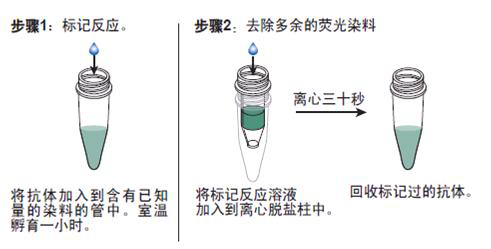
|

| 产地 | 进口、国产 |
| 品牌 | 上海莼试 |
| 保存条件 | Store at -20 °C |
| 货号 | CS11345 |
| 应用范围 | WB=1:100-500 ELISA=1:500-1000 IHC-P=1:100-500 IHC-F=1:100-500 ICC=1:100-500 IF=1:100-500 |
| CAS编号 | |
| 抗体名 | Anti-SPG3A/Atlastin |
| 克隆性 | |
| 靶点 | 详见说明书 |
| 适应物种 | 详见说明书 |
| 形态 | 详见说明书 |
| 宿主 | 详见说明书 |
| 亚型 | IgG |
| 标识物 | 详见说明书 |
| 浓度 | 1mg/1ml% |
| 免疫原 | KLH conjugated synthetic peptide derived from human SPG3A/Atlastin (201-300aa) |
产品订购信息:
英文名称 Anti-SPG3A/Atlastin
中文名称 G蛋白结合蛋白3抗体费用
别 名 AD FSP; atl1; ATLA1_HUMAN; Atlastin GTPase 1; Atlastin-1; Atlastin1; Brain specific GTP binding protein; Brain-specific GTP-binding protein; FSP1; GBP-3; GBP3; GTP-binding protein 3; Guanine nucleotide-binding protein 3; Guanylate binding protein 3; hGBP3; HSN1D; Spastic paraplegia 3 protein A; SPG 3A; SPG3; SPG3A.


浓 度 1mg/1ml
规 格 0.2ml/200μg
抗体来源 Rabbit
克隆类型 polyclonal
交叉反应 Human, Mouse, Rat, Rabbit
产品类型 一抗
研究领域 细胞生物 神经生物学 结合蛋白 G蛋白偶联受体 G蛋白信号
蛋白分子量 predicted molecular weight: 64kDa
性 状 Lyophilized or Liquid
免 疫 原 KLH conjugated synthetic peptide derived from human SPG3A/Atlastin (201-300aa)
亚 型 IgG
纯化方法 affinity purified by Protein A
储 存 液 Preservative: 15mM Sodium Azide, Constituents: 1% BSA, 0.01M PBS, pH 7.4
G蛋白结合蛋白3抗体费用 产品应用 WB=1:100-500 ELISA=1:500-1000 IHC-P=1:100-500 IHC-F=1:100-500 ICC=1:100-500 IF=1:100-500
(石蜡切片需做抗原修复)
not yet tested in other applications.
optimal dilutions/concentrations should be determined by the end user.
保存条件 Store at -20 °C for one year. Avoid repeated freeze/thaw cycles. The lyophilized antibody is stable at room temperature for at least one month and for greater than a year when kept at -20°C. When reconstituted in sterile pH 7.4 0.01M PBS or diluent of antibody the antibody is stable for at least two weeks at 2-4 °C.
Important Note This product as supplied is intended for research use only, not for use in human, therapeutic or diagnostic applications.
产品介绍 Atlastins are Golgi-localized, integral membrane proteins that function as GTPases. The Atlastin proteins, also designated SPG3A and guanylate-binding protein 3, comprise a Dynamin superfamily that plays a role in axonal maintenance. Hereditary spastic paraplegia (HSP) is an inherited neurodegenerative disorder that is characterized by retrograde axonal degeneration. HSP primarily affects long corticospinal neurons and causes spastic lower extremity weakness. Spastin, a microtubule (MT)-severing AAA ATPase, is a binding partner of Atlastin that is involved in membrane dynamics. This Spastin/Atlastin binding may be involved in the biochemical pathway that leads to HSP development. Mutations in the Atlastin gene (SPG3A) account for approximately 10% of all autosomal dominant HSPs, while mutations in the Spastin gene (SPG4) account for almost 40%.
Function : GTPase tethering membranes through formation of trans-homooligomer and mediating homotypic fusion of endoplasmic reticulum membranes. Functions in endoplasmic reticulum tubular network biogenesis. May also regulate Golgi biogenesis. May regulate axonal development.
Subunit : Homooligomer. Interacts (via N-terminal region) withMAP4K4 (via CNH regulatory domain). Interacts with REEP5, RTN3 andRTN4 (via the transmembrane region). Interacts with SPAST;interaction is direct. May interact with TMED2. Interacts withREEP1.
Subcellular Location : Endoplasmic reticulum membrane. Golgi apparatus membrane. Cell projection > axon.
Tissue Specificity : Expressed predominantly in the adult and fetal central nervous system. Measurable expression in all tissues examined, although expression in adult brain is at least 50-fold higher than in other tissues. Detected predominantly in pyramidal neurons in the cerebral cortex and the hippocampus of the brain. Expressed in upper and lower motor neurons (at protein level).
DISEASE : Defects in ATL1 are the cause of spastic paraplegia autosomal dominant type 3 (SPG3) [MIM:182600]; also known as Strumpell-Lorrain syndrome. Spastic paraplegia is a degenerative spinal cord disorder characterized by a slow, gradual, progressive weakness and spasticity of the lower limbs.
Similarity : Belongs to the GBP family. Atlastin subfamily.
Database links : UniProtKB/Swiss-Prot: Q8WXF7.1

Anti-Phospho-TAK1 (Thr184/187)/FITC 荧光素标记磷酸化转化生长因子β活化激酶1抗体IgGMulti-class antibodies规格: 0.2ml
Insulin Receptor-Alpha(ISR-Alpha) 受体-α(抗原)Multi-class antibodies规格: 0.5mg
新型基因/一种新发现的基因抗体 Anti-Runx3 0.1ml
SHP-1 英文名称: 造血细胞磷酸酶抗体 0.1ml
ECHS1 英文名称: 烯脂酰辅酶A水解酶抗体 0.1ml
Rhesus antibody Rh phospho-MK1/MAP2K1(Thr292) 磷酸化原活化蛋白激酶1抗体 规格 0.1ml
Insulin Receptor-Alpha(ISR-Alpha) 受体-α(抗原)Multi-class antibodies规格: 0.5mg
Anti-phospho-P53 (Ser20)/FITC 荧光素标记磷酸化抑制基因P53抗体IgGMulti-class antibodies规格: 0.2ml
Rabbit Anti-Goat IgG/Biotin 生物素化兔抗羊IgGMulti-class antibodies规格: 0.1ml
降钙素抗体 Anti-CT 0.2ml
Rabbit Anti-mouse IgM/PE-CY5 PE-CY5标记的兔抗小鼠IgM 0.1ml
FENS1 英文名称: 磷酸肌醇结合蛋白1抗体 0.2ml
Rhesus antibody Rh phospho-YES1(Tyr537) 磷酸化原癌基因酪氨酸蛋白激酶Yes1抗体 规格 0.1ml
Rabbit Anti-Goat IgG/Biotin 生物素化兔抗羊IgGMulti-class antibodies规格: 0.1ml
IQGAP1 支架蛋白抗原Multi-class antibodies规格: 0.5mg
Anti-ADM R 肾上腺髓质素受体抗体Multi-class antibodies规格: 0.1ml
Rhesus antibody Rh Phospho-cdc2 (Thr14) 磷酸化周期素依赖激酶2抗体 规格 0.1ml
BCIP/NBT显色试剂盒-深蓝色 50ml Sigma原料,单一组分
VAT1L 英文名称: 囊泡胺转运蛋白1家族蛋白抗体 0.2ml
DRIL1 英文名称: B淋巴细胞转录调节相关蛋白DRIL1抗体 0.2ml
Anti-ADM R 肾上腺髓质素受体抗体Multi-class antibodies规格: 0.1ml
IL11RA Protein Canine 重组狗 IL11RA / IL-11RA / IL11Rα 蛋白 (His 标签)
大鼠视网膜色素上皮细胞完全培养基 100mL
KLK6 Others Human 人 KLK6 / Kallikrein 6 / Neurosin 人细胞裂解液 (阳性对照)
Tca-8113人舌鳞癌细胞 Tca-8113 human tongue squamous cell carcinoma 1640+10% FBS
人脑微内皮细胞
NCI-H2452(人间皮瘤细胞) 5×106cells/瓶×2 L1210(细胞)
CM-R076大鼠主动脉平滑肌细胞完全培养基100mL
ADCYAP1R1 Others Human 人 ADCYAP1R1 人细胞裂解液 (阳性对照)
小鼠皮肤肥大细胞完全培养基 100mL
SP2/0小鼠细胞 Mouse myeloma cell line SP2/0 RPMI-1640(GIBCO)+10%FBS
IL12B Protein Human 重组人 IL12B / P40 蛋白 (His 标签)
WI38/VA13(SV-40Z转化) 5×106cells/瓶×2 3T3-L1, 小鼠前脂肪细胞
G蛋白结合蛋白3抗体费用 IL11RA Protein Canine 重组狗 IL11RA / IL-11RA / IL11Rα 蛋白 (His 标签)
大鼠视网膜色素上皮细胞完全培养基 100mL
KLK6 Others Human 人 KLK6 / Kallikrein 6 / Neurosin 人细胞裂解液 (阳性对照)
Tca-8113人舌鳞癌细胞 Tca-8113 human tongue squamous cell carcinoma 1640+10% FBS
人脑微内皮细胞
NCI-H2452(人间皮瘤细胞) 5×106cells/瓶×2 L1210(细胞)

抗体的生物素化标记实验要点:
1. G蛋白结合蛋白3抗体费用 如在反应混合液中有叠氮钠或游离氨基存在,会抑制标记反应。因此,蛋白质在反应前要对 0.1mol/L碳酸氢钠缓冲液或0.5mol/L硼酸缓冲液充分透析;
2.所用的NHSB及待生物素化蛋白质之间的分子比按蛋白质表面的ε-氨基的密度会有所不同,选择不当则影响标记的效率,应先用几个不同的分子比来筛选最适条件;
3.用NHSB量过量也是不利的,抗原的结合位点可能因此被封闭,导致抗体失活;
4.由于抗体的氨基不易接近可能造成生物素化不足,此时可加入去污剂如 Triton x-100, Tween20等;
5.当游离ε-氨基(赖氨酸残基的氨基)存在于抗体的抗原结合位点时,或位于酶的催化位点时,生物素化会降低或损伤抗体蛋白的结合力或活性;
6.生物素还可能与不同的功能基团,如羰基、氨基、巯基、异咪唑基及苯酚基,也可与糖基共价结合;
7.交联反应后,应充分透析,否则,残余的生物素会对生物素化抗体与亲和素的结合产生竞争作用;
8.在细胞的荧光标记实验中,中和亲和素的本底低,但由于链霉亲和素含有少量正电荷,故对某些细胞可导致高本底。
抗体的鉴定:
1)G蛋白结合蛋白3抗体费用 抗体的效价鉴定:不管是用于诊断还是用于,制备抗体的目的都是要求较高效价。不同的抗原制备的抗体,要求的效价不一。鉴定效价的方法很多,包括有试管凝集反应,琼脂扩散试验,酶联免疫吸附试验等。常用的抗原所制备的抗体一般都有约成的鉴定效价的方法,以资比较。如制备抗抗体的效价,一般就采用琼脂扩散试验来鉴定。
2)抗体的特异性鉴定:抗体的特异性是指与相应抗原或近似抗原物质的识别能力。抗体的特异性高,它的识别能力就强。衡量特异性通常以交叉反应率来表示。交叉反应率可用竞争抑制试验测定。以不同浓度抗原和近似抗原分别做竞争抑制曲线,计算各自的结合率,求出各自在IC50时的浓度,并按公式计算交叉反应率。
如果所用抗原浓度IC50浓度为pg/管,而一些近似抗原物质的IC50浓度几乎是无穷大时,表示这一抗血清与其他抗原物质的交叉反应率近似为0,即该血清的特异性较好。
3)抗体亲和力:是指抗体和抗原结合的牢固程度。亲和力的高低是由抗原分子的大小,抗体分子的结合位点与抗原决定簇之间立体构型的合适度决定的。有助于维持抗原抗体复合物稳定的分子间力有氢键,疏水键,侧链相反电荷基因的库仑力,范德华力和空间斥力。亲和力常以亲和常数K表示,K的单位是L/mol。抗体亲和力的测定对抗体的筛选,确定抗体的用途,验证抗体的均一性等均有重要意义。